
by Mark Smiley | Nov 20, 2017 | General Featured
by Glen Richardson
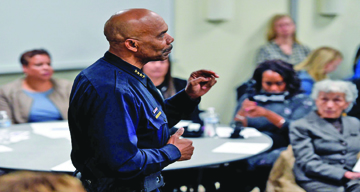 Denver Police have not implemented any recommendations from a 2016 audit meant to help officers avoid racial bias in patrol duties, a follow-up report in September 2017 finds. Denver Auditor Timothy M. O’Brien, CPA, made his original recommendations in a January 2016 audit of police operations, including updates to biased policing policies and demographic data collection.
Denver Police have not implemented any recommendations from a 2016 audit meant to help officers avoid racial bias in patrol duties, a follow-up report in September 2017 finds. Denver Auditor Timothy M. O’Brien, CPA, made his original recommendations in a January 2016 audit of police operations, including updates to biased policing policies and demographic data collection.
“It’s important for Denver Police policies to protect and serve all people equally,” explains Auditor O’Brien. “There is no way to tell if officers are stopping people without bias regarding race, gender or age if officers choose not to document demographic data.”
According to the American Civil Liberties Union (ACLU): Racial profiling refers to the practice by law enforcement officials of targeting individuals for suspicion of crime based on the individual’s race, ethnicity, religion or national origin. Criminal profiling, generally, as practiced by police, is the reliance on a group of characteristics they believe to be associated with crime. Examples of racial profiling are the use of race to determine which drivers to stop for minor traffic violations or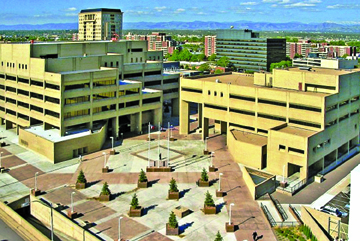 the use of race to determine which pedestrians to search for illegal contraband.
the use of race to determine which pedestrians to search for illegal contraband.
Secret House Surveys
The previously agreed-upon recommendation involved communicating with the U.S. Department of Justice’s Office of Community Oriented Policing Services for options on how to utilize the Community Policing Self-Assessment Tool (CP-SAT). This tool could help officers evaluate the effectiveness of community policing efforts over time. Instead, Denver Police said it conducted other surveys to get input from staff. The Denver Police Foundation also conducted an independent community survey. Auditors were unable to see these survey results or the contents of the survey. Denver Police shared no information regarding the independent survey, which the Denver Police Protective Association (PPA) keeps for internal purposes.
“We cannot assess whether either survey met the spirit of or captured content similar to the CP-SAT survey,” the follow-up report says. “As a result, we consider this recommendation as having not been implemented,” the report concludes.
Other recommendations the department previously disagreed with included updating its Biased-Policing Policy to include an annual assessment of collected demographic data, and requiring officers to collect data for all pedestrian and traffic self-initiated contact. Currently, officers only collect this data for encounters that lead to a citation, arrest or street check.
Double Standard?
Within weeks following the auditor’s report, an overwhelming majority of Denver police officers say they have no confidence in the ability of Chief Robert White to lead the department. In a news conference on Oct. 24 Denver Police Protective As sn. President Nick Rogers announced than a survey of 582 union members yielded a 94 percent “no confidence” vote.
sn. President Nick Rogers announced than a survey of 582 union members yielded a 94 percent “no confidence” vote.
The vote, according to PPA, reflects a perception by the rank and file officers that there exists a lack of transparency within the police administration and a double standard applies to conduct of high-ranking members of the police administration,” Rogers told the conference.
When asked if the union had ever issued a “no confidence” vote before. Rogers replied, “Never.”
PR Policing Policy
The police department has long touted its community-oriented policing philosophy. Denver Police first incorporated community policing into its operations in the 1980s. However, without demographic data from police encounters there is no way to ensure community-policing efforts are effective or equitable. The department says it has communicated with stakeholders, including community leaders, about ways to collect more information. However, there is no plan in place at this time for collecting personal data from individuals about interactions with police.
The Department of Public Safety has not implemented any of the recommendations made in the Police Operations — District Patrol audit report. Accordingly, Auditor O’Brien has determined that the risk associated with the audit team’s initial findings has not been mitigated.
Auditor Timothy M. O’Brien, CPA, has more than 40 years of auditing and accounting experience and strives to bring greater clarity, transparency and accountability to Denver’s city government for its residents. Elected in 2015, he is distinguished from his predecessors by being an actual professional auditor. He is a licensed Certified Professional Accountant and holds the designations of Chartered Financial Analyst and Chartered Global Management Accountant.
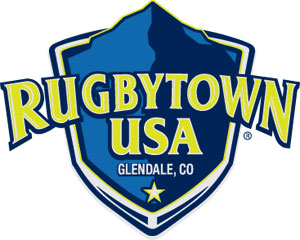
by Mark Smiley | Nov 20, 2017 | Glendale City News
by John Arthur
Writer for and on behalf of the City of Glendale

GLENDALE, CO – OCTOBER 7: Glendale Merlins Women vs Berkley All Blues at Infinity Park on October 7, 2017 in Glendale, Colorado. (Photo by Seth McConnell)
As Glendale prepares for the 2018 launch of Major League Rugby, the town also honors its storied history of attracting talented players. Two veteran Glendale ruggers, Hannah Stolba and Carmen Farmer, announced at the final home match at Infinity Park in October that they would hang up their cleats at season’s end. Even in retirement, however, both of these exceptional players intend to remain involved with the sport and with Glendale.
Stolba was born in Montana, and grew up playing basketball, eventually being awarded a basketball scholarship to Minnesota State University, Mankato. She picked up rugby during the offseason on the advice of a friend, and took to the sport quickly, “I loved it. I fell in love with the game and the challenge and mostly the people. Rugby was much more free form and I enjoyed that.” Before finishing college, Stolba began playing for the Minnesota Valkyries, even touring with the club’s Under-23 team in New Zealand.
After finishing college Stolba moved to Minneapolis and continued playing with the Valkyries for another six years, moving to Colorado in 2011. Among her many accolades, Stolba played with the USA Women’s Rugby Team from 2012 through the 2014 World Cup. Following the 2014 season, she casually mentions that she “thru-hiked the Appalachian Trail” (the longest footpath in the world, the nearly 2,200 mile trail stretches from Maine to Georgia), before spending six months playing and coaching in New Zealand in 2016.
Stolba says she chose Colorado not just for the outdoor lifestyle the state is famous for, but also because of the programming and facilities at Infinity Park. She notes that she still intends to be involved with the game — playing touch rugby and coaching — but that retirement from club play is meant to allow more time for hobbies and hiking. Asked what message she had for Glendale, Stolba was quick to thank the city and its people for their support: “It’s very uncommon in the U.S. to get picked out of a crowd for playing rugby, but we live in this unique pocket . . . thank you, for supporting us the way that you do. It is greatly appreciated from our whole program.”
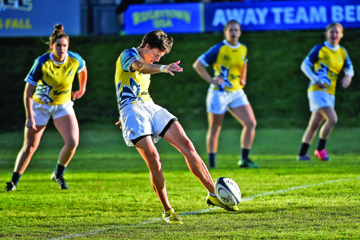
GLENDALE, CO – OCTOBER 21: Glendale Merlins Women vs San Diego Surfers at Infinity Park on October 21, 2017 in Glendale, Colorado. (Photo by Seth McConnell)
Carmen Farmer was born in Richmond, Virginia. She grew up in the state, attending college at Virginia Tech, where she played collegiate softball. After college she earned a law degree from the University of Maryland and practiced on the Eastern Shore of Maryland, not discovering rugby until some five years later. In an interesting twist of fate, the future Olympic rugby player discovered the sport after a conversation with an Australian while hiking Mt. Kilimanjaro.
Upon her return from Tanzania, Farmer found the Severn River Women’s Rugby Club in Annapolis, Maryland, and walked onto a practice a week later. 2012, her first year playing rugby, the team took second in the National Championships. Two years later Farmer played in the World Cup in France. She notes that during this time she played her first match at Infinity Park, facing a South African team in 2013.
Farmer played at Severn River for three years at the Division 2 level before moving to San Diego, where she trained with the Seven’s National Team. Following the Rio Olympics, she took a job with a Land Trust in Colorado and began playing for Glendale. Asked about what drew her to Glendale, she notes the program’s “rich history and high level of play,” and, with a smile, “the facilities aren’t too bad either.”
Farmer doesn’t have firm plans for retirement, but intends to focus more time on work. Even if she’s not on the pitch, however, she will remain a fan of the sport. Asked for final reflection on her time in Glendale, she extends a sincere thank you to the community for welcoming her during her short tenure with the team: “It has been an absolute pleasure getting to play here, and the support from the staff and the people of Glendale has been second to none.”
Though Farmer and Stolba both spoke fondly of their time in Glendale, the city, and rugby fans everywhere owe acknowledgment to these accomplished players as well. Through their tireless efforts on the pitch, their character, and their passion for sport, they have helped maintain Glendale’s position at the epicenter of rugby in the United States. Past is prologue in RugbyTown USA, and it’s just as bright as the city’s future.
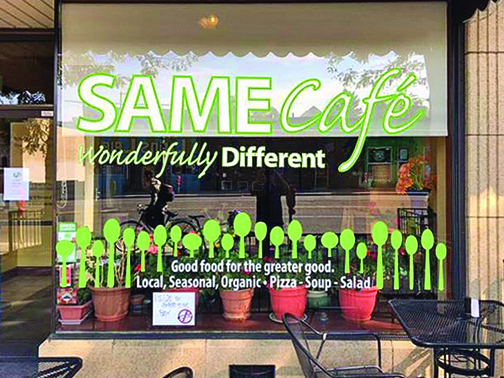
by Mark Smiley | Nov 20, 2017 | Travel
by Ruthy Wexler
 SAME Café’s mission is feeding the hungry. Its name stands for So All May Eat. But the café itself resembles an elegant little bistro, complete with outside dining.
SAME Café’s mission is feeding the hungry. Its name stands for So All May Eat. But the café itself resembles an elegant little bistro, complete with outside dining.
Nothing about SAME Café, at 2023 E. Colfax, says “homeless” or “charity.” That’s the uniqueness of this restaurant, where Cherry Creek residents, suburban folk, busy professionals — and people down on their luck — all get welcomed and well-fed.
Uniquely Different
I’ve ordered lunch, it looks delicious — but I stand confused. No prices listed, no cash register in sight.
How do I pay? I ask.
“You pay what you want,” smiles the girl at the counter.
After devouring the richly flavored soup (homemade vegetable stock, definitely) and relishing my pizza’s contrasting bites of apple, kale and blue cheese, I wonder: How could a “donation based” restaurant serve such exquisite food — and survive?
The answer, says Executive Director Brad Reubendale, is community. “We have the greatest group of volunteers and customers, who are invested in our succes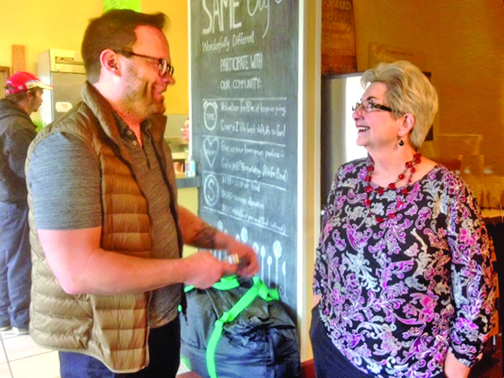 s.”
s.”
More and more groups now use the café for meetings. Increasing numbers book it for private parties and events. The café’s good intentions toward the community have brought win/win results.
Doing Well
Having supported local farmers, the café now receives so much donated produce, they only have to purchase basic food. They support local businesses — and a local businessman, and their landlord sets their rent below market value.
“What I see over and over, if you trust people to be helpful and intelligent, for the most part, they’ll be that way,” says Reubendale. “People on the poverty line pay a dollar for lunch. Others know this and give way more than the meal’s worth”
“We eat here a lot,” says Laura Mueller, lunching with fellow retired physician Danica Larson. “We want to support their mission. And the food is amazing. So healthy!”
Healthy food — where it all started.
History
In 2003, Brad and Libby Birky were at a crossroads. An IT consultant, he yearned to be a chef. But Birky wanted no part of the late-night restaurant lifestyle, so they researched other options. Both had volunteered at soup kitchens, but the disconnect between those who doled out the food and those who ate it didn’t sit right. And the food was not healthy.
What if a soup kitchen served food so good that people with money chose to eat there, too?
There was one such restaurant, they discovered. After visiting One World in Salt Lake City, the Birkys became 100% committed. Banks refused to loan them money so they cashed in their IRAs. The city’s red tape almost botched 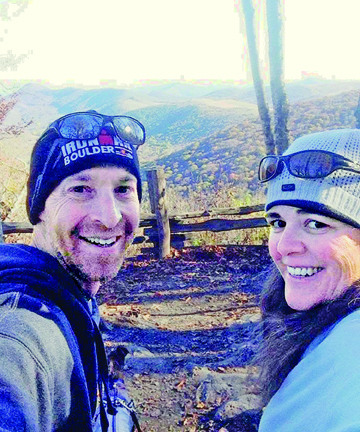 the project. But finally, on October 20, 2006, the SAME Café opened.
the project. But finally, on October 20, 2006, the SAME Café opened.
Something Incredible
The Birkys’ original idea — giving everyone access to good, healthy food — remains the café’s driving force.
People get interested in the café’s mission. They return because of the food. Each day, two kinds of soup, two kinds of salad, two pizzas, and one cookie are offered. Natural-ingredient menus planned by an exuberant chef feature Strawberry Soup, Braised Brisket Stew, Roasted Mushroom and Quinoa Salad.
Tables for two line the walls, but the long table down the café’s center affords an unusual opportunity: eating alongside someone from a very different life. “Something incredible happens when people who have millions sit down next to someone experiencing homelessness,” reports Reubendale.
So Much Change
A volunteer describes when someone who’s been living on the street comes in to eat. “They light up, like, ‘All this nice stuff for me? I’m not looked down upon here?’”
“It’s beautiful. No one brags about money here. No one’s shamed if they don’t have it.”
People living below the poverty line are treated with as much dignity as a wealthy person, says Reubendale. “That’s why we don’t give handouts. If someone wants free food, we say, ‘Here, please eat. Then we ask how they’d like to participate in our community. One hour of work pays for a meal.’
“When someone’s ready, we have a great resource list. A computer they can use to research jobs or housing.”
“So many lives have been changed here,” Reubendale muses. “Not just the hungry. Rich people who needed purpose. Sick people who began eating healthy, then got well…”
People often asked the Birkys how to start a restaurant just like SAME. Now the couple is on a road trip, visiting the 50+ cafés across the country they inspired and mentored.
Talk about change.
Holiday Giving
The café has just created wooden circles that say SAME Café: One Free Lunch.” Think of driving down Speer Boulevard with a bagful of these tokens to give out! Purchasing them provides two good works in one: giving to SAME Café’s mission — and connecting a person in need with a service that could change their lives.
You can buy the tokens with a donation (the café suggests the full price of meals, around $12). Or email brad@soallmayeat.org, who will get the tokens to you.
The SAME Café is open Monday-Saturday, 11 a.m. to 2 p.m. For more information visit www.soallmayeat.org.

by Mark Smiley | Nov 20, 2017 | Editorials
 Perhaps the greatest upset of the November 7 election in Colorado was the approval by Denver voters of the citizen referred Initiative 300, better known as “Green Roof Initiative,” by a clear 54% to 46% margin. Denver resident Brandon Rietheimer and a group of environmental activists prevailed against the odds. They started this summer gaining signatures and submitted over 4,700 this past August to make the ballot.
Perhaps the greatest upset of the November 7 election in Colorado was the approval by Denver voters of the citizen referred Initiative 300, better known as “Green Roof Initiative,” by a clear 54% to 46% margin. Denver resident Brandon Rietheimer and a group of environmental activists prevailed against the odds. They started this summer gaining signatures and submitted over 4,700 this past August to make the ballot.
The initiative mandates new buildings larger than 25,000 square feet must dedicate some of their roof space to trees, plants, solar panels or a mix. Existing buildings are not included unless they either expand to above 25,000 square feet or they need a new roof.
The initiative was opposed by all the forces and money that control the Mayor’s Office and the rest of the city. Rietheimer and his hardy band were outspent according to the financial disclosure records by an incredible 12 to 1 margin with the proponents raising only $20,000. Conversely the “no” side had over a quarter million dollars in their pockets to bend the voting public to their side.
The “no” contributors were a Who’s Who of those who wish to destroy Denver for their own purpose led by developer Pat Hamill’s Colorado Concern organization which has dozens of Denver fat cats whose only real “concern” is lining their own pockets at the expense of the public.
Will green roofs work? Will the Denver Botanic Gardens build an elaborate garden and display on top of its parking garage to the delight of thousands of visitors ever y year? It goes without saying that the same will reduce noise and pollution in the city which is never a bad idea.
y year? It goes without saying that the same will reduce noise and pollution in the city which is never a bad idea.
The Mayor’s greedy friends argued that it would increase the cost of developments in the city and, of course, it will. Similarly, any open space requirements or parking requirements also raise the cost of the potential developments until they are waived by the city’s corrupt Community Planning and Development Department. The mayor’s friends believe that the only real purpose of parks and open space is to be monetized for commercial enterprises which, of course, they did to Ruby Hill Park and Overland Park Golf Course.
They also love to see parks used for massive drainage holes to save land for development on the I-70 project. Wouldn’t want the Mayor’s friends’ land to be used for such a purpose.
If you hate the idea of greenery on top of roofs don’t despair — it’s not going to actually happen. Mayor Hancock after passage of the Initiative stated, “We have always made a good-faith effort to implement the initiatives — once the people have spoken, that’s our job.”
He is, of course, lying.
Initiative 300 provides that it can be amended after six months with two-thirds vote of the City Council. Pat Hamill and his friends own more than two-thirds of the City Council and it will be slowly amended until the Initiative becomes virtually meaningless.
Moreover, any implementation would have to go through the Department of Community Planning and Development. Its Executive Director is the corpulent Brad Buchanan. He proved with his interpretation of no parking required for micro units that he will perversely interpret virtually any provision of law for benefit of high density developers. Rietheimer and his band of rebels will find that Buchanan will determine Ordinance 300 to mean exactly the opposite of what they intended. Buchanan is Denver’s very own Queen of Hearts from Alice in Wonderland where any word in Ordinance 300 means “just what I [Brad Buchanan] choose it to mean — neither more nor less.” Mr. Rietheimer unfortunately is going to get to learn how things really work in today’s City and County of Denver.
But citizens for the first time ever during the Hancock Administration have shown that they can defeat all the King’s horses and all the King’s men even when outspent 12 to 1. For the first time, Pat Hamill’s regime has suffered a loss. Let us pray that this is just the beginning and not a one-time aberration.
— Editorial Board

by Mark Smiley | Oct 23, 2017 | General Featured
Celebrating Its 10th Anniversary, Attendees Can Choose From Music, Dance, Film Author Lectures
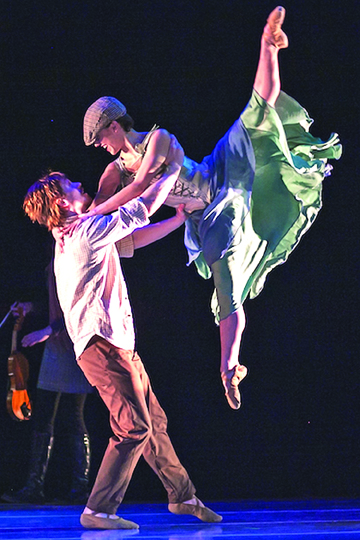 The Valley isn’t lacking for festivals, but a select few consistently find a way to differentiate themselves in a crowded field. The 10th annual celebration of Jewish Arts, Authors, Movies & Music Festival (JAAMM) has distinguished itself from the crowd. The 18-day one-of-a-kind culture extravaganza opened Oct. 26 and Valley residents have an array of awesome choices as events continue through Nov. 12 at the Mizel Arts & Culture Center (Jewish Community Center).
The Valley isn’t lacking for festivals, but a select few consistently find a way to differentiate themselves in a crowded field. The 10th annual celebration of Jewish Arts, Authors, Movies & Music Festival (JAAMM) has distinguished itself from the crowd. The 18-day one-of-a-kind culture extravaganza opened Oct. 26 and Valley residents have an array of awesome choices as events continue through Nov. 12 at the Mizel Arts & Culture Center (Jewish Community Center).
The wide variety of November choices contrast from a showing of Ron Suskind’s award-winning film, Life, Animated, to the keynote speech by renowned film critic and historian Leonard Maltin. Also this month audiences can enjoy the Stomp-style Israeli percussion, dance troupe Tararam and acclaimed Israeli-American jazz pianist Tamir Hendelman plus operatic bass Anthony Mordechai Tzvi Russell, performing traditional Ashkenazi Jewish and African American music.
Celebrating the festival’s 10th anniversary there is a wide array of programming choices. Among the lineup of events remaining, several top selections stand out and are not to be missed:
Author Lectures
Author and Rabbi Naomi Levy has penned a book based on a poignant letter written by the 20th century’s most influential physicist Albert Einstein. She talks about the book titled Einstein and the Rabbi: Searching for the Soul in the Phillips Social Hall Nov. 2, 2 p.m. His words captured what she believes to be true about the human condition and how we are all intimately connected.
That evening in the Wolf Theatre renowned civil rights activist and speaker Morris Dees speaks at 7 p.m. He discusses how our commitment to justice for all will chart our nation’s future as America becomes more diverse and as economic disparity widens. Dees will share his experiences and insights, explaining why he became an attorney and founded the Southern Poverty Law Center. Prior to his talk there is a private reception from 5:30-6:30 p.m.
The author of Sons and Soldiers written by Bruce Henderson is another lecture you won’t want to miss. He tells the little-known stor y of nearly 2,000 German-born American Jews who enlisted in the U.S. Army and were sent overseas as a special unit interrogating German POWs. Known as the “Ritchie Boys,” their contributions in fighting Hitler were invaluable. He speaks in Phillips Social Hall Nov. 7 at 11 a.m. and the lecture is free for veterans.
y of nearly 2,000 German-born American Jews who enlisted in the U.S. Army and were sent overseas as a special unit interrogating German POWs. Known as the “Ritchie Boys,” their contributions in fighting Hitler were invaluable. He speaks in Phillips Social Hall Nov. 7 at 11 a.m. and the lecture is free for veterans.
Dance & Film
You’ll enjoy the excitement, beauty, timing and precision of dance when the Wonderbound Dance Company performs in the Wolf Theatre Nov. 9, 7:30 p.m. With live music accompaniment by Hal Aqua & The Lost Tribe, this is a high octane, humorous and poetically athletic extravaganza.
Described as one of the most truthful films about show business, see the documentary film Joan Rivers: A Piece of Work, showing in the Wolf Theatre Nov. 5, 7 p.m. It exposes the private dramas of the irreverent, legendary comedian and pop icon Rivers. Moreover, it is very funny.
Documentary film Mr. Gaga shows in the Wolf Theatre Nov. 12, 11 a.m. It tells the story of Ohad Naharin, the renowned choreographer-artistic director of Israel’s Batsheva Dance Company. Footage of intimate rehearsals and breathtaking dance sequences make this a breathtaking film.
Music & Singing
Drum-up friends and family to enjoy the Israeli Stomp-style drum and dance sensation Tararam at the Wolf Theatre on Nov. 4, 7:30 p.m. These performing artists produce a blend of rhythm, music, movement and wit, interwoven with choreographed body drumming, amusing sounds and theatrical antics.
Then on Sunday, Nov. 5 at 1:30 p.m. catch the Anthony Mordechai Tzvi Russell concert also in the Wolf Theatre. His singing combines 100 years of traditional Ashkenazi Jewish and African American music. Accompanied by Dr. Alan Mason his concert recently sold-out at the Berkeley Jewish Music Festival.
For many people there’s no better music than jaz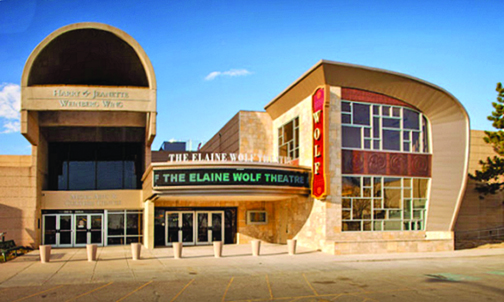 z and if you’re one of them don’t miss award-winning jazz pianist Tamir Hendelman and his trio playing in the Wolf Theatre Nov. 11, 7:30 p.m. Playing alongside upright bassist Alex Frank and jazz drummer Dean Koba they are a phenomenon. Together the trio explores jazz standards, Brazilian music, blues and Tamir’s Israeli roots.
z and if you’re one of them don’t miss award-winning jazz pianist Tamir Hendelman and his trio playing in the Wolf Theatre Nov. 11, 7:30 p.m. Playing alongside upright bassist Alex Frank and jazz drummer Dean Koba they are a phenomenon. Together the trio explores jazz standards, Brazilian music, blues and Tamir’s Israeli roots.
The festival is open to the entire Cherry Creek Valley and features a wide array of multidisciplinary programs in addition to those listed. There’s plenty more to see and experience. Information: 303-316-6360 or maccjcc.org/jaamm.

by Mark Smiley | Oct 23, 2017 | Glendale City News
by John Arthur
Writer for and on behalf of the City of Glendale
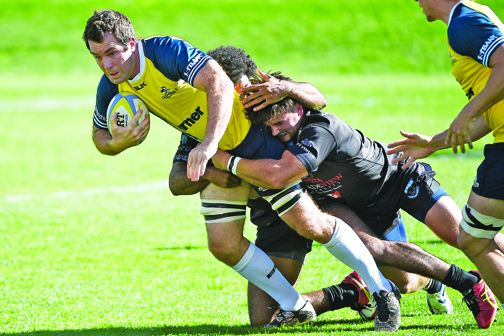
GLENDALE, CO – OCTOBER 7: Glendale Merlins Men vs New York Old Blue at Infinity Park on October 7, 2017 in Glendale, Colorado. (Photo by Seth McConnell)
Sponsor partnerships are an important and mutually beneficial aspect of regional sports teams, organizations, and venues. Glendale’s Infinity Park, the first rugby-specific venue in the nation, offers a unique and vibrant platform from which sponsors can create their own brand awareness, engage in community outreach, and target an enthusiastic and growing rugby fan base. Infinity Park and the Glendale Rugby Club have recently welcomed a sponsor partnership with SCL Health — a relationship that begins as Infinity Park celebrates its 10th anniversary in Glendale, and as the Raptors prepare to enter the next chapter of the organization’s rich history.
SCL Health is a faith-based, non-profit health organization headquartered in Broomfield, Colo. SCL Health traces its history – and its name – to the Sisters of Charity Leavenworth, a Catholic religious institution that follows in the tradition of 17th century French leaders, Saints Vincent de Paul and Louise de Marillac. Dedicated to improving the health of the people and communities they serve, SCL’s $2.5 billion dollar healthcare network aspires to provide comprehensive, coordinated care in Colorado and Montana. In Colorado, SCL Health operates Saint Joseph Hospital in Denver, Lutheran Medical Center in Wheat Ridge, Good Samaritan Medical Center in Lafayette, Platte Valley Medical Center in Brighton, and St. Mary’s Medical Center in Grand Junction. With 11 total hospitals, more than 115 physician clinics, and over 18,000 employees, the organization focuses on excellent patient care quality, and is especially dedicated to improving the health of the poor and vulnerable.
Tim Shonsey, the Regional Director of Marketing and Communications for SCL Health’s Front Range hospitals, says he’s had his eye on sponsorship at Infinity Park for some time: “We decided to sponsor Infinity Park because it’s a great venue to connect with the Glendale community. Having a growing sports audience that has a direct connection to one of our providers made it an easy decision.” Shonsey re-marked that sponsorship is an important part of SCL Health’s general community outreach as well, noting that the organization also supports Colorado Public Radio and partners with other media outlets to provide health information to the communities it serves. “The most important part of any partnership opportunity is our ability to promote health and wellness to people who may one day become our patients,” said Shonsey.
Uniquely, SCL Health’s partnership with Infinity Park extends beyond the recent sponsorship. Dr. Michael DaRosa, a Sports Medicine Physician at SCL Health Medical Group – Denver Sports Medicine, is also the team physician for the Glendale Raptors and Merlins. Specializing in musculoskeletal injuries, pain treatment, and a sports-related concussion specialist, DaRosa has been treating Glendale’s rugby players since 2016: “I love caring for these extremely tough, strong, and skilled athletes on the sidelines and in my office. My goal for all my patients is get them back in action as safely and quickly as possible. It is an absolute pleasure caring for these hardworking athletes at beautiful Infinity Park.” Asked about why SCL Health would endeavor to become a sponsor partner of Infinity Park, DaRosa remarked that the organization appreciates seeing active, motivated individuals — exact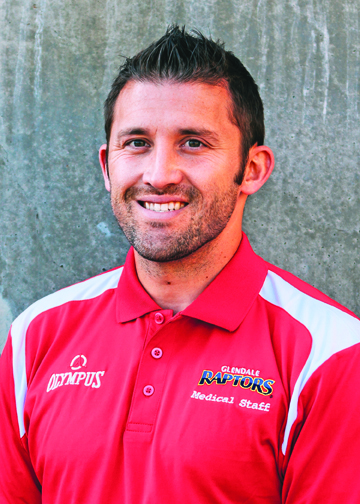 ly the kind of patrons that Infinity Park and the Glendale Rugby Clubs attract. Just as Coloradans are passionate about rugby, SCL Health is passionate about caring for the communities it serves.
ly the kind of patrons that Infinity Park and the Glendale Rugby Clubs attract. Just as Coloradans are passionate about rugby, SCL Health is passionate about caring for the communities it serves.
Since its founding in 2007, Infinity Park has become a hub not just for entertainment, community, and, of course, rugby, but has also served as a nexus of Colorado’s healthy, active character. Celebrating 10 years of impassioned growth, and standing on the brink of a new chapter of explosive rugby expansion, Glendale is also proud to be embarking on a new sponsor partnership with SCL Health. No doubt the new sponsor is also looking forward to a fruitful relationship — alongside Glendale’s loyal fan base, the Raptors’ role as a founding team in the forthcoming Major League Rugby organization means that SCL is poised to see a significant return on investment.

 Denver Police have not implemented any recommendations from a 2016 audit meant to help officers avoid racial bias in patrol duties, a follow-up report in September 2017 finds. Denver Auditor Timothy M. O’Brien, CPA, made his original recommendations in a January 2016 audit of police operations, including updates to biased policing policies and demographic data collection.
Denver Police have not implemented any recommendations from a 2016 audit meant to help officers avoid racial bias in patrol duties, a follow-up report in September 2017 finds. Denver Auditor Timothy M. O’Brien, CPA, made his original recommendations in a January 2016 audit of police operations, including updates to biased policing policies and demographic data collection.  the use of race to determine which pedestrians to search for illegal contraband.
the use of race to determine which pedestrians to search for illegal contraband. sn. President Nick Rogers announced than a survey of 582 union members yielded a 94 percent “no confidence” vote.
sn. President Nick Rogers announced than a survey of 582 union members yielded a 94 percent “no confidence” vote. 













